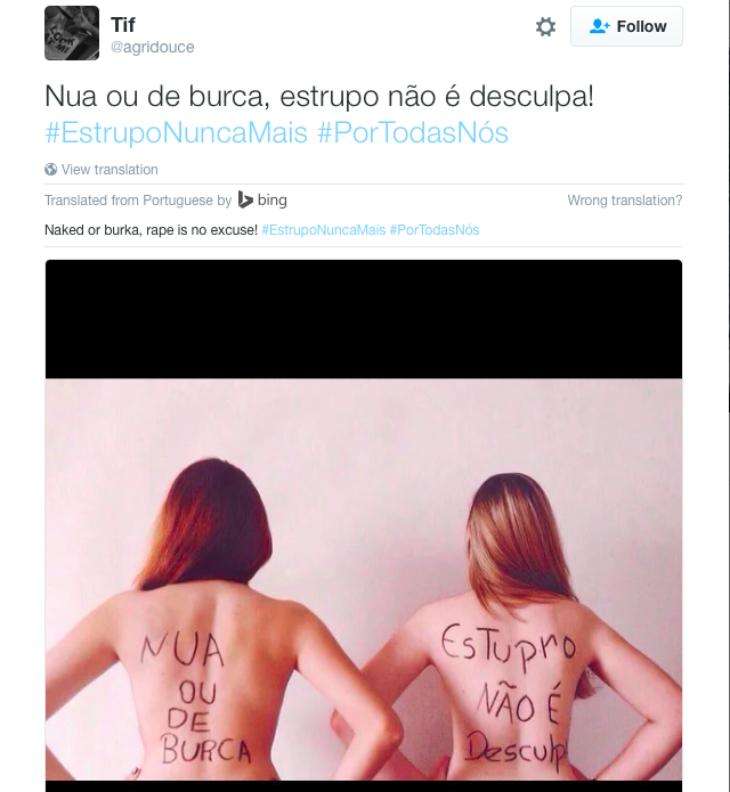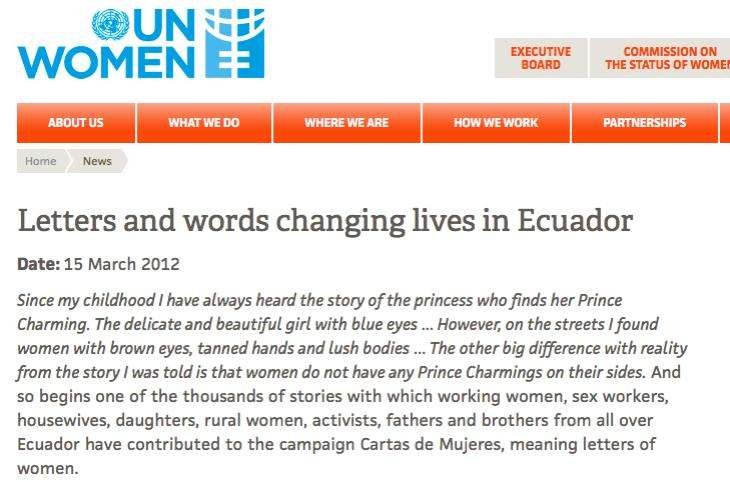How some women are fighting back against the 47,646 rape cases in Brazil

In just under a month's time, the Rio De Janeiro Olympics are set take place. However, the event has come under a shadow, not just for the infrastructure failings that threaten the game themselves, but for developments unrelated to the Olympics entirely.
With the country already in a state of political and economic uncertainty, further fuel was added to the social unrest in Brazil due to a spate of instances of sexual violence against women.
Also read - Gender sensitivity isn't a game - but one videogame is out to teach it
No country for women
Last week, a 25-year-old businesswoman and 13-year-old schoolgirl were gang raped in different parts of Brazil, sparking national and international outrage.
The incidents were only the latest in a series of cases of sexual violence against women.
A 16-year-old girl was gang raped by 30 men in Sao Paolo's favelas (slums) earlier this May. It was a case that was so brutal it drew parallels with the December 16 Nirbhaya incidents in Delhi.
The girl supposedly stayed at her boyfriend's house and was doped and threatened with arms. She later woke up in a different house, naked and wounded. The assault lasted for 36 hours and the victim is now undergoing treatment and counseling.
A few days later, an explicit 40-second video and various photographs of her ordeal were posted on social media. What made it worse was that the video received over 500 likes, with a multitude of misogynistic comments.
Brazil's sexual violence problem
Unlike India, Brazil's women are in the majority, forming 52% of the country's population. However, sexual violence in Brazil is a major problem with a staggering 47,646 rape cases recorded since 2015, with an estimated 35% of rapes being reported.
Data released from the Brazilian Forum on Public Security, showed a woman is raped every 11 minutes - a truly horrific statistic. Many argue that rape culture and gender divisions have been woven into Latin American society.
That has also become evident at the highest level after former president, Dilma Vana Rousseff was impeached and a cabinet reshuffle lead to an all-male cabinet.
According to the World Health Organization, the country is 7th out of 84 for the worst rate of female homicide, with a Brazilian woman being killed every 2 hours.
The victim of the favela attack spoke against rape. "All of us can go through this one day. It does not hurt the uterus but the soul because there are cruel people not being punished!!"
The 16-year-old added, "I really thought I was going to be badly judged."
Mexican-Brazilian actress, Giselle Itie, while pointing out the part media plays in propagating such violence, stated - "the blame is on the media, who sexualize women in all their products."
She went on to say, "The blame is on the newspaper that makes light of the many rapes that happen...Drunk, drugged, wearing a short skirt, naked, it doesn't matter. It is never the victim's fault."
The co-ordinator of the Disque Denúncia hotline in Rio, Zeca Borges, spoke to Pubblicità magazine: "People don't have the courage to complain. It's the classic husband-and-wife fight: no one gets involved.
Fighting back against Brazil's rape culture
Despite sexual violence in Brazil being an unavoidable reality, the Brazilian media has been strongly criticised for ignoring cases of sexual assault.
With national media in Brazil being this apathetic to sexual violence, Pamela Oliveria, a 24-year-old activist, decided something had to be done.
Also read - Can women be rapists? Reality says yes. The law, however, says no
In light of the recent events of rape, Oliveria organized a rally 24 hours after the favela case. The protest attracted thousands of people. Oliveria stated, "the more we share what we suffer, the more it will improve".
The rape cases and frequent protests sparked a number of responses on social media. Viral campaigns like, 'Curiosity Saves' encourages women to speak up about domestic violence. In Brazil, where an estimated 13 million women in a country of 200 million have been victims of domestic violence.
The hashtag #EstrupoNuncaMais (meaning rape never again), has become popular online and hundreds of thousands have spoken against the crimes. Other popular hashtags include, #MyFirstHarrassment, inspired by the 'Women's Spring' movement.

1
— Don Juan (@Nat_attack_18) June 2, 2016
2
3
4
5
6
7
8
9
10
11
12
13
14
15
16
17
18
19
20
21
22
23
24
25
26
27
28
29
30
The # of men that raped a Brazilian girl. #estruponuncamais
16-year-old girl raped by 30 men in Brazil last week and I have never been more disgusted #EstrupoNuncaMais https://t.co/zRU91iNfCT
— chiquitita (@cleotrapa_) May 30, 2016
All men must work to stop culture of rape #BoysWillBeBoys #rapeculture #BrockTurner #estruponuncamais https://t.co/cW37xR81hz
— CRISTIANE SANTOS (@crica_firenze) June 11, 2016
#EstrupoNuncaMais And some people have the nerve to that say rape culture doesn't exist...this is literally breaking me down 😞
— Couscous (@PriscilliaOpale) May 30, 2016
However, the greatest online success came from the UN's 'Cartas de Mujeras' ('Letters from Women'). This campaign was first launched in Ecuador and invites women to write and share their experiences of sexual violence.
Also read - Drunk, unconscious, violated with oral sex: This isn't rape says Oklahoma court

So far, it has collected 12,000 letters within 3 months of starting in Ecuador. The project has grown, spreading to Guatemala and Peru where it received 15,000 letters alone and 17,000 in Bolivia.
One can only hope that with so many successful campaigns and protests that there will be change and women's safety will become more of a priority in Brazil. Because, let's face it, who cares about an international sporting event when Brazil's own women are living in fear?
First published: 8 July 2016, 12:22 IST





![BJP's Kapil Mishra recreates Shankar Mahadevan’s ‘Breathless’ song to highlight Delhi pollution [WATCH] BJP's Kapil Mishra recreates Shankar Mahadevan’s ‘Breathless’ song to highlight Delhi pollution [WATCH]](https://images.catchnews.com/upload/2022/11/03/kapil-mishra_240884_300x172.png)

![Anupam Kher shares pictures of his toned body on 67th birthday [MUST SEE] Anupam Kher shares pictures of his toned body on 67th birthday [MUST SEE]](https://images.catchnews.com/upload/2022/03/07/Anupam_kher_231145_300x172.jpg)






